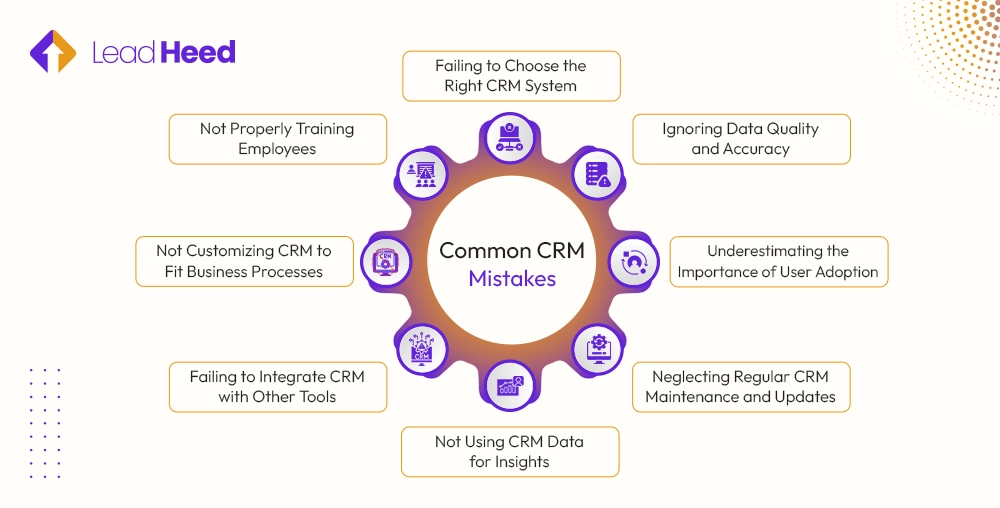Poor CRM performance leads to workflow disruptions, user frustration, and, ultimately, a burden on the business. And more often than not, it’s due to easily avoidable CRM mistakes. These errors don’t just hinder the growth of your business; they also cost you sales and reduce customer satisfaction.
However, with the right approach, these mistakes can be avoided. This article breaks down the eight most frequent CRM mistakes businesses make, explains why they happen, and gives you practical steps to avoid them. This will help you transform your CRM into a valuable business growth engine.
8 Common CRM Mistakes That Are Hurting Your Business
Common CRM mistakes businesses make when implementing a CRM include choosing the wrong CRM, ignoring data quality, neglecting employee training, and underestimating user adoption.
1. Failing to Choose the Right CRM System
One of the most common mistakes is not choosing the right CRM system that meets your specific needs. A CRM is supposed to contribute to business growth and ensure efficiency. But when business goals don’t align with the system, it fails to provide the intended results. Every business’s needs are different, and one must choose a CRM that fulfills their requirements.
For instance, when a small business selects a CRM with advanced features, it doesn’t necessarily need them. The system becomes complex for the team to adopt. In addition, it leads to wastage of resources due to underutilization.
2. Not Properly Training Employees
Another common mistake when implementing a CRM is a lack of proper employee training. Employees often resist adopting a new CRM system when they lack the correct training. They need to understand what the CRM is for and how to use it to gain maximum benefits.
When employees are not trained properly, it creates confusion and leads to incorrect data entry, a lack of standardization, and inefficient use of CRM features.
3. Ignoring Data Quality and Accuracy
Any CRM’s success depends upon good-quality data. Otherwise, it can result in poor customer experiences, failed communication, and duplicate efforts. When the data stored in a CRM is not accurate, the whole purpose of the CRM will go in vain.
Inaccurate information, such as wrong contact information, duplicate data, and outdated information, degrades a CRM’s overall performance. Not only this, but it also damages your business’s reputation. It results in unproductive marketing campaigns and faulty analytics and reporting, leading to poor decision-making.
4. Not Customizing CRM to Fit Business Processes
Since every business has its own unique goals, system, and processes, not all CRMs fit perfectly. However, most businesses use CRMs without customization, leading to failures. Not setting the CRM up to handle specific workflows, like tracking customer information, causes inefficiencies, mistakes, and demotivated staff.
Therefore, a CRM must be customized according to the business goals to streamline processes and enhance productivity. This provides a clear vision of organizational processes and validates that the system aligns with specific business goals.
5. Underestimating the Importance of User Adoption
Underestimating the importance of user adoption is a blunder that anyone can make during CRM implementation. CRM is primarily designed for sales, marketing, and customer support teams. If these teams refuse to use the system, then no matter how good the CRM is, it fails.
Lack of user adoption results in incomplete data, miscommunication between managers and teams, and limited return on investment. Thus, without widespread and consistent user adoption, the CRM becomes an expensive, underutilized tool that fails to deliver business value.
6. Failing to Integrate CRM with Other Tools
Failing to integrate your CRM with other tools limits its effectiveness. The whole purpose of CRM integration is to allow your system to work seamlessly with your existing tools. Whether it’s Google Sheets, email platforms, or marketing automation software. Without the integration capabilities, you’d be stuck managing and updating data manually across platforms, leading to duplicate entries and errors.
Lack of integration also disrupts customer relationships, causing delayed responses, repeated questions, and misinformed conversations. To avoid this, make sure your CRM is integration-friendly and supports the tools your team relies on.
7. Neglecting Regular CRM Maintenance and Updates
CRM maintenance and updates are two critical components of any CRM’s success, and neglecting these is a blunder. Your system needs timely updates and necessary improvements to stay ahead and relevant. Inability to do so results in ineffective campaigns, an outdated system, ultimately decreasing customer satisfaction, and leading to a loss of customers.
Additionally, it roots out issues like compliance risks, slower system performance, and increased errors in the system. These later results in eroded user trust in the system.
8. Not Using CRM Data for Insights
The primary goal of CRM is to collect and organize data, transforming it into valuable insights for informed decision-making. Not leveraging CRM data for insights is like starving yourself when the food is on the table. This does harm to both sides as it misses the opportunity for growth, improvement, and optimization.
Moreover, it results in an inability to personalize experiences, failure to identify customer trends, and a lack of informed decision-making.
How to Avoid CRM Mistakes?
Here are our tips on how you can avoid making the common CRM mistakes:
- Identify your goals and objectives for using CRM: First, you must be clear about what you want to achieve with a CRM system.
- Choose a CRM that perfectly matches your needs: Ensure the CRM has the features necessary to meet your goals.
- Utilize the system to its fullest: Make sure no functionalities are underutilized—explore and apply all useful tools.
- Training is the key: Equip your team with essential training so they feel confident using the CRM.
- Educate your team: Help them understand how CRM benefits your business and reduces manual workload.
- Maintain data quality: Keep your data clean, accurate, and up to date.
- Perform regular maintenance and updates: Regular upkeep ensures your CRM continues running efficiently.
- Integrate your CRM with existing tools: This boosts productivity and ensures smooth operations across platforms.
- Select a CRM vendor that offers continuous technical support: Ongoing assistance helps resolve issues quickly and keeps your team supported.
- Actively use client input and analytics: This results in better customer relationships and more efficient CRM utilization.
How CRM Mistakes Impact Your Business?
CRM mistakes can lead to poor customer relationships, missed sales opportunities, and inefficiencies in your workflow. These errors can ultimately hurt your bottom line, slow business growth, and damage your brand’s reputation.
- When you don’t define your goals clearly, you end up with the wrong CRM. Such a CRM doesn’t help achieve goals and becomes only a financial burden with ineffective processes and frustrated users.
- If your data is not updated and accurate, it leads to poor decision-making, ultimately reducing overall productivity.
- Without proper training, employees feel lost and confused, resulting in decreased productivity and increased errors.
- Ignoring customer feedback and analytics limits your understanding of clients, damaging trust and loyalty.
- Inconsistent follow-ups or delayed responses also damage trust and hurt your brand reputation.
- A lack of vendor support can leave technical problems unresolved, disrupting workflows.
- Underutilizing CRM features wastes money and effort, as you’re not getting the full value of the system.
Conclusion
CRM systems are powerful tools for business growth, but common mistakes can turn them into costly burdens. The wrong choice of CRM, inadequate employee training, neglecting data quality, or insufficient customization leads to inefficiency and missed opportunities.
Underutilizing features, failing to maintain the CRM system, and ignoring data insights disrupt processes and undermine customer trust, ultimately harming your business’s reputation and bottom line.
However, they are avoidable pitfalls. By clearly defining your goals, selecting the right CRM, training your people, and using analytics, you can get the most out of your CRM. A well-run CRM streamlines operations, enhances customer relationships, and speeds success. Take the time to get it right, and your CRM will be an effective tool for achieving your business goals.
FAQ
How does CRM fail?
CRM (Customer Relationship Management) often fails when employees resist change, usually because of insufficient training and poor adaptability to new systems.
What is the major challenge faced by CRM?
The major challenge faced by CRM is poor user adoption, hindering its potential to drive customer engagement and business success.
What is the main disadvantage of CRM?
The main disadvantage of CRM is that it fails to deliver value to the business when not implemented properly, resulting in only a financial burden.
Why do so many CRM programs fail?
Most CRM programs fail because of a lack of user adoption, poor quality data, a complex system, and ineffective implementation strategies.
How do I know which CRM is right for my business?
You can know the right CRM for your business by identifying business objectives and choosing the one that aligns with your business goals.
What’s the best way to train my team on using the CRM effectively?
To effectively train your team on using the CRM, provide simplified, hands-on training sessions customized for each team member’s role, with live illustrations and easy-to-read instructions to build confidence and consistency.
How can I ensure the data in my CRM stays accurate and up-to-date?
You can ensure the data in your CRM stays accurate and up-to-date by automating data updates, regular audits, and holding team members accountable for data accuracy.



